- Home
- Jan-Philipp Sendker
Dragon Games Page 2
Dragon Games Read online
Page 2
How was a person to trust when the most important thing in his life had been taken away? Overnight, through no fault of his own, and for no reason. Someone who had had to witness white blood cells multiplying relentlessly, watch their numbers rise and rise as no medicine in the world could stop them. What could he rely on now? What, Christine, what?
She had not answered this question with words. She had stayed by him even when he pushed her away. She had trusted him more than he had trusted himself. Trust can be infectious, she had warned him. And she had been right.
It was just after midnight. In Yung Shue Wan the voices of the evening had long died away and the lights of most of the restaurants had gone out. Lamma had given itself over to peace. Paul opened the large sliding door to the garden and stepped outside. How loud the night was in the tropics. The cicadas chirped away tirelessly and the shrill croaking of the toads in a nearby pond filled the air. The bush in front of him rustled loudly; probably a snake hunting down a rat. The bamboo canes bent slightly in the gentle breeze. He had listened to this regular creaking and groaning so often, and fallen asleep to it.
Christine would normally have rung him long before this time. To wish him good night. He had checked several times that his telephone was switched on, that the volume was on, and that the battery did not need charging. He could not remember a Sunday when she had not called. Perhaps she had simply lain down on her bed for a moment and fallen asleep in exhaustion. He missed hearing her voice, and had thought a few times about calling her. But that would not have been the same. He needed the gesture.
Hungry for love. Maybe she was right.
He decided to send her a text message.
My love, my darling, why have you not been in tou
No, he did not want to make any accusations.
My love, my darling, where are you? I was really looking forward to yo
Not even veiled ones.
My love, my darling, sleep well. Thank you for today. Thank you for everything. I love you. More and more.
He hesitated. Added ‘I need you and I miss you’. And deleted it. He did not want to sound needy.
Paul read his text message a few times. He was not used to writing text messages and did not want to risk any misunderstanding. Finally, he sent it, switched his phone off and immediately felt better. Tomorrow morning she would reply with a few tender lines and the anxiety would be over.
It was a dreamless night. He slept well, longer than usual, and when he woke, his first thought was of Christine. What a gift it was to wake next to her while she was still sleeping. To feel the warmth of her body. Her regular breathing.
How little it took now to find happiness in its hiding place. How often we simply walk past it.
He reached for his phone next to the bed and switched it on. No new messages. Paul suddenly felt the same unease that had plagued him last night. It was too early, he told himself. At this hour she was taking a shower and getting ready for a long day in the office. She normally only texted him once she was on the MTR train on the way to Wan Chai.
He got up, tied the mosquito net in a knot, went down to the kitchen and put some water on to boil for tea. The air had cooled only slightly during the night – the thermometer by the window displayed twenty-five degrees and eighty-eight percent humidity, and it was not even eight a.m. yet. Paul had to hurry. The sun would be shining on the roof terrace shortly, and would soon beat down so fiercely that he would have to seek protection from it, doing tai chi in the shade instead. The exercises always took exactly one hour. They helped him to start the day after bad nights and gave him, at least for that hour, a feeling of almost cheerful ease.
Not today. His movements were imprecise and strangely clumsy; his hips were much too stiff and his shoulders tense. He even started the “single whip” and “white crane spreads wings” from the beginning, but was not able to achieve a harmonious flow of movements.
By evening he finally made contact with her. They only spoke briefly by phone. It was busier than usual in Christine’s office and in the evening her son had a high fever and needed his mother.
Of course Paul understood. She didn’t have to explain or apologize.
On Tuesday morning came a text message; Christine told him that she would not be able to come to Lamma that Sunday. He rang her three times. All three conversations were unusually short. Their first call was cut short because a customer stuck at the airport in Jakarta was complaining, then Cathay Pacific was canceling flights, then she had the pediatrician on the other line. Each time, she did not call back as promised.
Her silence. Paul tried to ignore it. He cleaned the house even more thoroughly than usual. Dusted the books, wiped down the shelves and mopped the floor. He rubbed the old Chinese wedding chest with new wax polish until it shone again. He cleared out the fridge and washed every compartment with soapy water. Immune system weakened. Make sure everything is especially clean. In the whole house. A minor infection can be life-threatening.
There are sentences, he thought, that follow us around all our lives. Justin would soon have been dead for four years. Nevertheless, to this day, Paul could not bear to have even the shadow of dirt in his house.
He went for a walk to the Pak Kok at the tip of the island. He left his phone at home. He did not want to be waiting for a phone call with every step he took.
He thought about the last two days and tried to think logically. What was he so upset about? That Christine had not found any time in the last forty-eight hours to exchange a few sentences with him in an unhurried way? It was unusual but she was a very busy woman. That her voice sounded less tender than it usually did? What was he? A teenager in love for the first time? He knew how much pressure she was under. Her mother made demands on her that he could not understand, but had to accept.
The more he thought about it, the more he understood that it was not Christine who was making him feel insecure. He was the one doing it.
She had asked him not long ago if he lived on Lamma in exile. The word had moved him strangely. Exile. Exilium in Latin, if he remembered correctly. A sojourn in a strange place. Banishment. No, he had replied immediately. No one has banished me. He was not a refugee, not fleeing persecution. He could not be spending time in a strange place because only people who had a home could do that. Paul did not have a home. His parents were dead. Nothing bound him to the country he had been born in. He remembered barely anything about Germany apart from the many ships in the harbor at Hamburg and, strangely, the deep and loud horn of the steamer that had brought them to America. His early years in Munich and his memories of his grandparents had faded with time.
He was an American citizen. His blue passport was proof of it. But it was no longer a travel document. After his mother died when he was nineteen he had left the country forever. He did not have relatives anywhere in the world that he knew personally.
Before, whenever people asked him, as they did from time to time, where home was, he always said, on Earth, more or less. Most of them thought he was joking.
He had lived in Hong Kong for over thirty years, but not in exile. If there was anywhere on this earth where he felt at ease, it was in this city. He was grateful to it. It had taken him in and never forced him to belong to any particular place. That suited him.
When he told Christine what he was thinking, she had replied that she had not meant her question that way. She had been thinking more of how he had withdrawn after Justin’s death. Had he voluntarily gone into exile because of it?
Paul had never asked himself this question; he owed it a reply.
A kind of self-imposed exile, fleeing life because he could not bear the pain and grief over his son? Perhaps. If that were so, then it was because of Christine that he had found his way back. Her patience, like an angel’s, in the first few months. Her strength, which had borne with his moods. Her ability not to expect more than he could give.
She had brought him back to life and made him realize the simple truth of an o
ld Chinese saying: “A human being alone is not a human being.”
Was it any wonder that he was sometimes over-sensitive in his reactions? He was surely not the first exile who found the return to a world that he had left, from one day to the next, difficult. There was a lot at stake. The short breath of happiness. As though fear needed a reason.
Once he returned from his walk, his cellphone showed a missed call. Christine. He called back. A busy tone. He tried again, with no luck. She would see on her phone display that he had called. She would ring back as soon as she had time.
He circled the telephone the way Justin had done with a bar of chocolate that he was not allowed to have. He picked up a book and put it down again a few minutes later. He tried some music. Brahms didn’t work. Neither did Beethoven. Puccini only intensified his longing. He rang her shortly after eleven p.m. He wanted to sound relaxed. Calm, cheerful, casual, everything but hungry for love.
“Is something wrong?” she asked immediately.
“No. Why?”
“You sound so—”
“How do I sound?”
“Down.”
He hated talking about important things with the small device pressed to his ear, asking questions and then hearing nothing but a hissing noise, not knowing when it would end. Waiting alone for answers that could be of meaning to him. He had to see who he was talking to in order to reassure himself that what was being said was reflected in the gestures and the body language, that it was consistent with what was in the person’s eyes. How much simpler it was to tell untruths on the telephone. The wrong tone of voice or a tiny, unimportant misunderstanding was enough to unsettle him, to cause a moment of doubt that could flare quickly into an argument. For him, the telephone magnified a person’s mood. It made the secure feel more certain and the fearful more frightened. Right now, he was one of the fearful. How was he to understand the harsh tone of her voice without being able to look into her eyes? He had no idea what to ask or what to say.
“I just wanted to hear your voice,” he said quietly.
“You woke me up.”
“I’m sorry.”
They were silent.
“Are you okay?” he asked.
“What do you mean?”
He wished he could hang up. Her words and her voice were making him feel the opposite of what he needed. If he weren’t careful, this conversation would not end well. How sensitive needy people were. It was not her fault.
“We’ve barely spoken since Sunday. This morning I received a text message in which you simply—”
“Paul, you have no idea what I’ve had to deal with these last few days. Josh is sick and is ringing me five times a day. My mother has a pain in her chest and won’t go to the hospital on her own for an examination. All hell has broken loose in the office. It’s May and I’m almost twenty percent down for the first half of the year. Do you know what it means if we don’t catch up?”
“I know, Christine. I just don’t understand—”
“You have too much time on your hands. That’s the problem,” she interrupted again. “If I spent all day cleaning the house, cooking and going for walks I would also think stupid things.”
What was he supposed to say to that?
“I’m sorry,” she said after a long pause. “I didn’t mean it that way.”
“You don’t have to apologize.”
“I didn’t mean to hurt you.”
Paul felt empty and exhausted, as if they had fought for two hours. “You mean, it’s nothing more than that?”
“More than that?” Her voice sharpened again. “Haven’t you heard what I said? That’s all a great deal, if you ask me.”
“Of course. That is all a great deal for you, but I didn’t mean that.”
“What, then?”
“I’m worried.”
“About me?”
“Yes. About us.”
She gave a deep sigh. “Paul, it’s late. I can’t sleep in tomorrow. My alarm is set for six thirty. Could we talk about it another time?”
Now he could hear how tired she sounded. “Of course. But when?”
“Soon. Very soon.”
“I love you. Sleep well.”
“I love you too. Good night.”
“You too. Always and for—”
She had hung up the phone.
I love you too. That was all he had wanted to hear. Like a child.
Paul thought about Justin. I love you. He had said that to him every night after he turned the light off. I love you too, a tired child’s voice had whispered back in the darkness.
She was absolutely right. He would go to Hong Kong tomorrow, ask her out to lunch, and apologize to her.
As if trusting was only for fools. As if we had a choice.
He would have liked to fall asleep with these comforting thoughts. Something kept him awake. A feeling that he did not dare himself to put into words.
TWO
She had hesitated for a moment. The office was very busy. It wasn’t a good time. Tomorrow would be a better day. But when she heard that he was already on the ferry, she agreed. Paul went straight from the pier to the IFC mall to buy a small box of her favorite pralines and a deep-red long-stemmed rose.
They met in World Peace Café, a restaurant in Tai Wong Street East in Wan Chai. It was on the ground floor of a Buddhist center barely five minutes from Christine’s office. They entered a vast room with floor-to-ceiling windows. By Hong Kong standards, there was a wasteful amount of space between the tables. Three vegetarian dishes had been written on a chalkboard. Quiet jazz music came from the speakers on the wall and several statues of Buddha, in different sizes, rested on the shelves around them. Every table had a small vase of flowers and a lit tea-light on it. It was the opposite of the crowded and noisy restaurants in which Christine normally had lunch.
Paul noticed she seemed uncomfortable. “Do you not like it here?”
“I do, I do.”
Her voice betrayed to him that she was not telling the truth. “Should we go somewhere else?”
“No, no.”
They ordered beetroot soup with tofu, two eggplant stews, water, tea, and a freshly pressed juice for Paul.
“The chef lives on Lamma,” he said, to get her mind off things. “He told me that the waiters, cleaners, and kitchen staff are all volunteers.”
“They must all have rich husbands,” Christine said drily.
They sat opposite each other in silence, and he felt the inner unease rise again. Something was not quite right with her. She had managed to cover it up on the phone but not now, sitting opposite him. He saw it in her eyes. The way they avoided his, the way she stared down at the table or looked past him at the wall. He saw it in her face: the lips were too thin and the small lines around her mouth too deep. This was not the way she looked when she was well.
He was afraid to ask. He was afraid she would say that everything was fine. He did not want to be lied to.
“Christine?” He hoped that the way he said her name would be question enough.
She looked at him without replying.
As the seconds passed, the silence made him feel more and more uncomfortable. “What’s wr—”
“Nothing,” she interrupted, then paused. “No. Quite a lot.” She took a deep breath, and buried her face in her hands. “I don’t know how to explain it to you.”She suddenly had tears in her eyes.
Was this the moment? Paul had the feeling that he had to hold on to something. He felt heavy, as if someone had put a leaden vest around him. Had she fallen in love with someone else? Had her husband returned? Or had she been to see a doctor and heard the terrible, comfortless words “I’m sorry to have to tell you . . .”?
“I need time,” she said after a pause that seemed endless. “I need a little bit of space.”
This sounds like the beginning of the end, Paul thought.
“What has happened between us?”
“Nothing.”
“Nothing?” H
e had raised his voice. The diners at the other tables turned to look at him.
“Four weeks ago we sat on my terrace and talked about whether we should move in together and now you suddenly need space. Why . . .” He wanted to get up and go to the ferry, to Lamma. Just get away.
“Please don’t go,” she said quietly, reaching for his hand.
Paul hesitated. He closed his eyes and tried to calm himself. He felt his heart racing.
“I love you, Paul.” Her voice. Far away. Despairing. “It’s not what you think.”
“What do I think?”
“That I’m in love with another man.”
He opened his eyes. “How do you know that?”
“Because that’s always the first thought that comes to men.”
He was silent for a moment. “With a woman?”
“No.”
“Why are you saying that you need space then? Am I too much for you?”
She shook her head, saying nothing.
“Am I too hungry for love?”
“No.” A smile flitted over her face.
“Why do you want more space then?”
“For your sake.”
“For my sake?” He looked at her uncomprehendingly.
“I’m frightened, frightened that I could . . .” She didn’t go on.
“Hurt me?” he said, finishing her sentence.
“No.”
“Leave me?”
“No. Kill you.”
“What did you say?” He thought he had misheard her.
She repeated the word.
Paul was on the verge of losing it.
“What do you mean by that?” he finally asked.
“Exactly what I said. I’m afraid I will kill you.”
“What makes you think that?”
“It’s a risk. I know it. Isn’t that enough?”
“No. How do you know it?”
“Someone told me.”
“Who?”

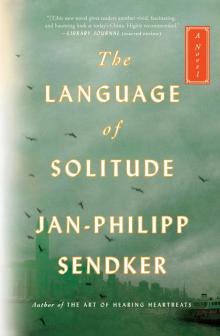 The Language of Solitude
The Language of Solitude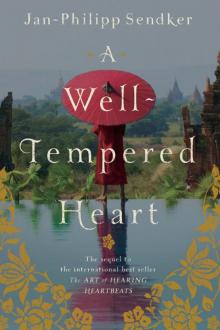 A Well-Tempered Heart
A Well-Tempered Heart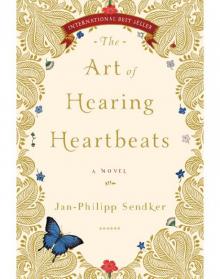 The Art of Hearing Heartbeats
The Art of Hearing Heartbeats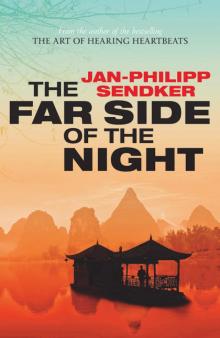 The Far Side of the Night
The Far Side of the Night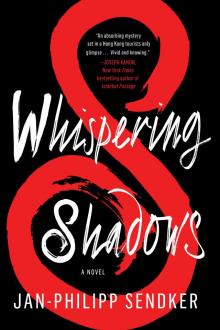 Whispering Shadows
Whispering Shadows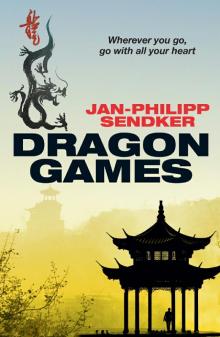 Dragon Games
Dragon Games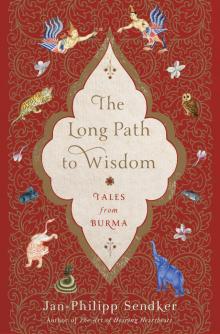 The Long Path to Wisdom
The Long Path to Wisdom